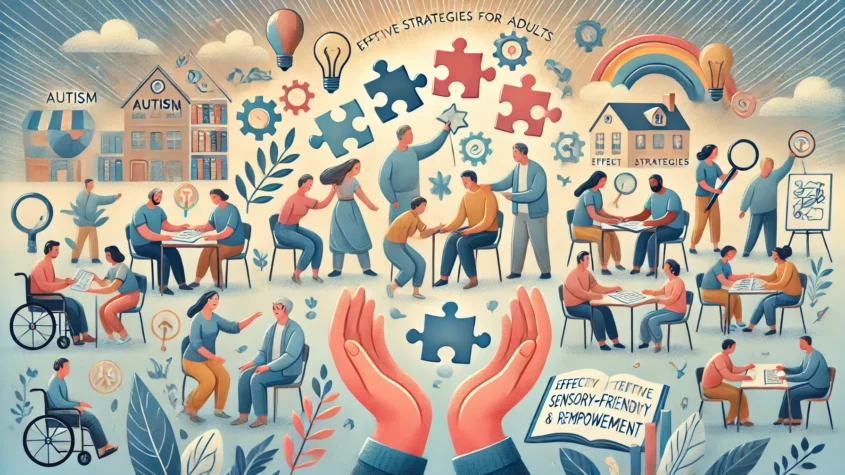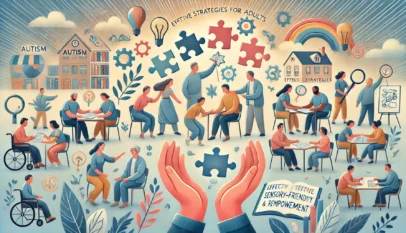
Programs for young adults with autism play a crucial role in fostering independence and enhancing life skills. These programs provide tailored support that benefits young adults by offering vocational training, social skills development, and community integration. Understanding the available options can empower families and individuals to make informed choices.
Many organizations focus on creating inclusive environments where young adults with autism can thrive. These programs often emphasize real-world experiences, preparing participants for job opportunities and social interactions that are essential for their development. Resources available range from local community initiatives to specialized training centers.
Engaging with these programs not only offers practical skills but also helps build confidence and a sense of belonging. Families searching for effective support systems will find valuable insights about the diverse offerings that can lead to meaningful outcomes in their loved ones’ lives.
Understanding Autism in Young Adults
Autism Spectrum Disorder (ASD) affects individuals in various ways as they transition into adulthood. Young adults with autism may face unique challenges and require support to navigate this phase of their lives.
Defining Autism Spectrum Disorder
Autism Spectrum Disorder is a complex neurodevelopmental condition characterized by variations in social interaction, communication, and behavior. Symptoms can range from mild to severe, impacting day-to-day functioning.
The Diagnostic and Statistical Manual of Mental Disorders (DSM-5) classifies ASD based on two main criteria: difficulties in social communication and the presence of restricted or repetitive behaviors.
Each individual experiences autism differently, which influences their strengths and challenges. This diversity means that support and interventions should be tailored to each young adult’s specific needs.
Challenges Faced by Young Adults with Autism
Young adults with autism often encounter significant challenges in various aspects of life. Social situations can be especially difficult, as they may struggle with reading nonverbal cues or understanding social norms. These challenges can lead to feelings of isolation or anxiety.
Employment is another area where difficulties arise. Many young adults with autism may face barriers in finding and maintaining jobs. Employers may not fully understand their capabilities or the unique perspectives they bring.
Additionally, mental health issues such as depression and anxiety can be prevalent. This underscores the need for targeted mental health support alongside autism-specific services.
Transitioning from Youth to Adulthood
The transition from youth to adulthood can be a daunting experience for individuals with autism. This period often involves significant changes, including moving from high school to post-secondary education or the workforce.
Planning for this transition is crucial and should begin early. Key elements include developing life skills, fostering independence, and exploring employment options.
It is beneficial for families to engage in Person-Centered Planning. This approach focuses on the individual’s strengths, preferences, and goals. Building a supportive network of family, educators, and service providers can facilitate a smoother transition.
Support programs tailored for young adults with autism can provide guidance and resources during this critical time. Such programs often emphasize social skills, job coaching, and community integration.
Programs and Resources for Support
There are various programs and resources specifically designed to assist young adults with autism. These initiatives focus on education, skills development, social inclusion, and therapeutic support.
Educational Programs and Vocational Training
Educational programs for young adults with autism often emphasize tailored learning approaches. These programs provide specialized curricula that accommodate individual learning styles and needs. Institutions may offer transition programs to bridge the gap between high school and adulthood.
Vocational training programs equip participants with essential job skills. They often include internships or job placement assistance to ensure practical experience. Collaborations with local businesses can create opportunities for employment and skill development.
Life Skills Development Programs
Life skills development is crucial for young adults with autism. These programs aim to enhance daily living skills, such as cooking, budgeting, and personal hygiene. Classes typically focus on practical applications, ensuring participants can integrate these skills into their daily lives.
Programs may also include social skills training to foster independence. This training can cover communication techniques, conflict resolution, and relationship-building. By focusing on these areas, young adults can navigate everyday situations more effectively.
Social Integration and Community Participation
Social integration programs facilitate connections within the community. They promote participation in group activities, clubs, or volunteer opportunities that foster socialization. These programs often involve structured outings, providing a comfortable setting for interactions.
Community participation can enhance confidence and reduce feelings of isolation. By engaging in local events or projects, young adults build relationships and a sense of belonging. Access to supportive peers can significantly impact their social skills and emotional well-being.
Support Services and Therapeutic Interventions
Support services are vital for addressing the specific needs of individuals with autism. Therapeutic interventions can include speech therapy, occupational therapy, and counseling. These services aim to improve communication, sensory processing, and emotional regulation.
Programs often employ evidence-based practices tailored to individual challenges. Professionals collaborate with families to create personalized plans that encourage progress. Access to these resources can significantly enhance the quality of life for young adults, promoting independence and personal growth.
Zudio Franchise: Unlocking Opportunities in Retail Business Expansion
Zudio franchises represent a promising opportunity for entrepreneurs looking to enter the …



